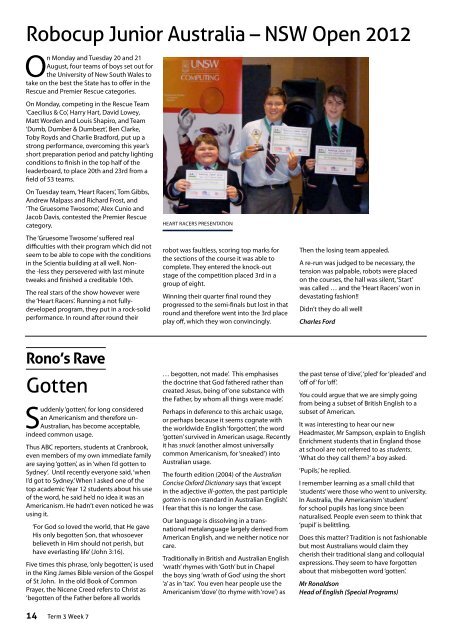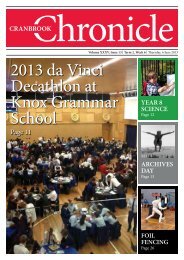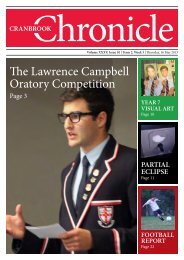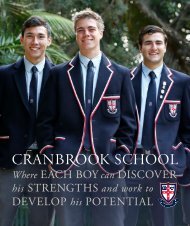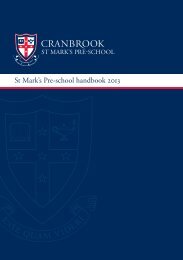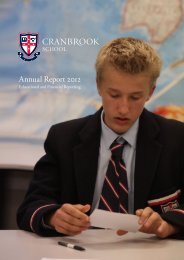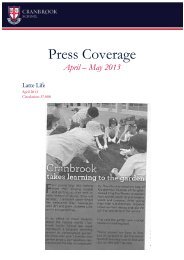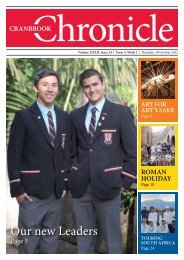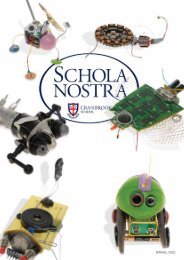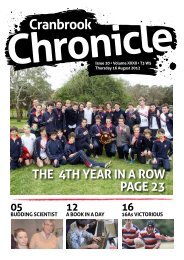Advertisements - Cranbrook School
Advertisements - Cranbrook School
Advertisements - Cranbrook School
You also want an ePaper? Increase the reach of your titles
YUMPU automatically turns print PDFs into web optimized ePapers that Google loves.
Robocup Junior Australia – NSW Open 2012<br />
On monday and Tuesday 20 and 21<br />
August, four teams of boys set out for<br />
the university of New South Wales to<br />
take on the best the State has to offer in the<br />
rescue and Premier rescue categories.<br />
On monday, competing in the rescue Team<br />
‘Caecilius & Co’, Harry Hart, David lowey,<br />
matt Worden and louis Shapiro, and Team<br />
‘Dumb, Dumber & Dumbezt’, Ben Clarke,<br />
Toby royds and Charlie Bradford, put up a<br />
strong performance, overcoming this year’s<br />
short preparation period and patchy lighting<br />
conditions to finish in the top half of the<br />
leaderboard, to place 20th and 23rd from a<br />
field of 53 teams.<br />
On Tuesday team, ‘Heart racers’, Tom Gibbs,<br />
Andrew malpass and richard frost, and<br />
‘The Gruesome Twosome’, Alex Cunio and<br />
Jacob Davis, contested the Premier rescue<br />
category.<br />
The ‘Gruesome Twosome’ suffered real<br />
difficulties with their program which did not<br />
seem to be able to cope with the conditions<br />
in the Scientia building at all well. Nonthe<br />
-less they persevered with last minute<br />
tweaks and finished a creditable 10th.<br />
The real stars of the show however were<br />
the ‘Heart racers’. running a not fullydeveloped<br />
program, they put in a rock-solid<br />
performance. In round after round their<br />
rono’s rave<br />
Gotten<br />
Suddenly ‘gotten’, for long considered<br />
an Americanism and therefore un-<br />
Australian, has become acceptable,<br />
indeed common usage.<br />
Thus ABC reporters, students at <strong>Cranbrook</strong>,<br />
even members of my own immediate family<br />
are saying ‘gotten’, as in ‘when I’d gotten to<br />
Sydney’. until recently everyone said, ‘when<br />
I’d got to Sydney.’ When I asked one of the<br />
top academic Year 12 students about his use<br />
of the word, he said he’d no idea it was an<br />
Americanism. He hadn’t even noticed he was<br />
using it.<br />
‘for God so loved the world, that He gave<br />
His only begotten Son, that whosoever<br />
believeth in Him should not perish, but<br />
have everlasting life’ (John 3:16).<br />
five times this phrase, ‘only begotten’, is used<br />
in the king James Bible version of the Gospel<br />
of St John. In the old Book of Common<br />
Prayer, the Nicene Creed refers to Christ as<br />
‘begotten of the father before all worlds<br />
14 Term 3 Week 7<br />
HeArT rACerS PreSeNTATION<br />
robot was faultless, scoring top marks for<br />
the sections of the course it was able to<br />
complete. They entered the knock-out<br />
stage of the competition placed 3rd in a<br />
group of eight.<br />
Winning their quarter final round they<br />
progressed to the semi-finals but lost in that<br />
round and therefore went into the 3rd place<br />
play off, which they won convincingly.<br />
… begotten, not made’. This emphasises<br />
the doctrine that God fathered rather than<br />
created Jesus, being of ‘one substance with<br />
the father, by whom all things were made’.<br />
Perhaps in deference to this archaic usage,<br />
or perhaps because it seems cognate with<br />
the worldwide english ‘forgotten’, the word<br />
‘gotten’ survived in American usage. recently<br />
it has snuck (another almost universally<br />
common Americanism, for ‘sneaked’) into<br />
Australian usage.<br />
The fourth edition (2004) of the Australian<br />
Concise Oxford Dictionary says that ‘except<br />
in the adjective ill-gotten, the past participle<br />
gotten is non-standard in Australian english’.<br />
I fear that this is no longer the case.<br />
Our language is dissolving in a transnational<br />
metalanguage largely derived from<br />
American english, and we neither notice nor<br />
care.<br />
Traditionally in British and Australian english<br />
‘wrath’ rhymes with ‘Goth’ but in Chapel<br />
the boys sing ‘wrath of God’ using the short<br />
‘a’ as in ‘tax’. You even hear people use the<br />
Americanism ‘dove’ (to rhyme with ‘rove’) as<br />
Then the losing team appealed.<br />
A re-run was judged to be necessary, the<br />
tension was palpable, robots were placed<br />
on the courses, the hall was silent, ‘Start’<br />
was called … and the ‘Heart racers’ won in<br />
devastating fashion!!<br />
Didn’t they do all well!<br />
Charles Ford<br />
the past tense of ‘dive’, ‘pled’ for ‘pleaded’ and<br />
‘off of’ for ‘off’.<br />
You could argue that we are simply going<br />
from being a subset of British english to a<br />
subset of American.<br />
It was interesting to hear our new<br />
Headmaster, mr Sampson, explain to english<br />
enrichment students that in england those<br />
at school are not referred to as students.<br />
‘What do they call them?’ a boy asked.<br />
‘Pupils,’ he replied.<br />
I remember learning as a small child that<br />
‘students’ were those who went to university.<br />
In Australia, the Americanism ‘student’<br />
for school pupils has long since been<br />
naturalised. People even seem to think that<br />
‘pupil’ is belittling.<br />
Does this matter? Tradition is not fashionable<br />
but most Australians would claim they<br />
cherish their traditional slang and colloquial<br />
expressions. They seem to have forgotten<br />
about that misbegotten word ‘gotten’.<br />
Mr Ronaldson<br />
Head of English (Special Programs)


